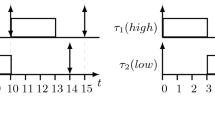Abstract
This paper proposes an approach to modular modelling and simulation of complex time-critical systems. The modelling language is represented by Merlin and Farber’s Time Petri Nets (TPNs) augmented with inhibitor arcs and modular constructs borrowed from the Petri Net Markup Language (PNML) interchange format. Analysis techniques depend on Temporal Uncertainty Time Warp (TUTW), a time warp algorithm capable of exploiting temporal uncertainty in general optimistic simulations over a networked context. A key feature of the approach is the fact that TPN models naturally exhibit a certain degree of temporal uncertainty which the TUTW control engine can exploit to achieve good speedup without a loss in the accuracy of the simulation results. The developed TUTW/TPN kernel is demonstrated by modelling and simulation of a real-time system example.
Similar content being viewed by others
References
Allen J (1983) Maintaining knowledge about temporal intervals. Commun ACM 26(11):832–843
Behrmann G, David A, Larsen KG (2004) A tutorial on Uppaal. In: Bernardo M, Corradini F (eds) Formal methods for the design of real-time systems, LNCS 3185, Springer, pp 200–236
Beraldi R, Nigro L (2001) A time warp mechanism based on temporal uncertainty. Trans Soc Modelling and Simul Int 18(2):60–72
Beraldi R, Nigro L, Orlando A (2003) Temporal uncertainty time warp: an implementation based on Java and ActorFoundry. Simul: Trans Soc Modelling and Simul Int 79(10):581–597
Berthomieu B, Diaz M (1991) Modelling and verification of time dependent systems using Time Petri Nets. IEEE Trans Soft Eng 17(3):259–273
Billington J, Christensen S, van Hee K, Kindler E, Kummer O, Petrucci L, Post R, Stehno C, Weber M (2003) The petri net markup language: concepts, technology, and tools. In Proc of the 24th Int Conf on Application and Theory of Petri Nets, LNCS 2679, Springer, pp 483–505
Bucci G, Fedeli A, Sassoli L, Vicario E (2004) Timed state space analysis of real-time preemptive systems. IEEE Trans Soft Eng 30(2):97–111
Burns A (2003) How to verify a safe real-time system: The application of model checking and timed automata to the production cell case study. Real-Time Syst 24(2):135–151
Buttazzo GC (2005) Hard real-time computing systems. 2nd edn. Springer
Carullo L, Furfaro A, Nigro L, Pupo F (2003) Modelling and simulation of complex systems using TPN Designer. Simul Modelling Pract Theory 11(7-8):503–532
Cicirelli F, Furfaro A, Nigro L (2006) An approach to protocol modelling and validation. In: Proc of 39th Annual Simulation Symposium (ANSS’06), IEEE Computer Society, Huntsville, Alabama, USA, pp 261–268
Clarke EM, Grumberg O, Peled DA (2000) Model checking. MIT Press, Cambrige, MA
Dmso, USA, Defense Modeling and Simulation Office, https://www.dmso.mil/public/transition/hla
Fujimoto RM (1999a) Approximate time causal order. College of Computing, Georgia Institute of Technology, Atlanta, GA
Fujimoto RM (1999b) Exploiting temporal uncertainty in parallel and distributed simulations. In: Proc. of Workshop on Parallel and Distributed Simulation (PADS’99)
Fujimoto RM (2000) Parallel and distributed simulation systems. John Wiley & Sons
Furfaro A, Nigro L (2005) An approach based on simulation and verification for the schedulability analysis of real-time systems. In: Proc of the 2005 Summer Computer Simulation Conference, pp 46–53. SCS
Furfaro A, Nigro L, Pupo F (2004) Model checking tasking sets using Time Petri Nets and Uppaal. In: Proc of 28th IFAC/IFIP Workshop on Real-Time Programming (WRTP’04), Istanbul, Turkey Sept 6–8
Kindler E, Weber M (2001) A universal module concept for petri nets. In: Proc of the 8th Workshops Algorithmen und Werkzeuge fr Petrinetze, pp 7–12
Kuhl F, Weatherly R, Dahmann J (2000) Creating computer simulation systems. Prentice Hall PTR
Lamport L (1978) Time, clocks and the ordering of events in a distributed system. Communi ACM 21(7):558–565
Larsen KG, Pettersson P, Yi W (1997) Uppaal in a nutshell. Soft Tools for Technol Transfer 1(1/2):134–152
Lewerentz C, Lindner T (1995) Case study production cell. In: Formal development of reactive systems, LNCS 891. Springer Verlag
Loper ML (2002) Approximate time and temporal uncertainty in parallel and distributed simulation. PhD thesis, College of Computing, Georgia Institute of Technology
Loper ML, Fujimoto RM (2000) Pre-sampling as an approach for exploiting temporal uncertainty. In: Proc of 14th Workshop on Parallel and Distributed Simulation (PADS’2000)
Loper ML, Fujimoto RM (2004) A case study in exploiting temporal uncertainty in parallel simulations. In: Proc of IEEE Int Conf on Parallel Processing (ICPP’04), pp 161–168
Merlin P, Farber D (1976) Recoverability of communication protocols—implications of a theoretical study. IEEE Trans Commun 24(9):1036–1043
Murata T (1989) Petri nets: properties, analysis and applications. Proc IEEE 77(4):541–580
Raynal M, Singhal M (1996) Logical time: capturing causality in distributed systems. IEEE Comput 29(6):49–56
Vicario E (2001) Static analysis and dynamic steering of time-dependent systems. IEEE Trans Soft Eng 27(8):728–748
Author information
Authors and Affiliations
Corresponding author
Additional information
A preliminary version of this paper was presented at 38th SCS Annual Simulation Symposium, April 4–6, 2005, San Diego (CA), IEEE Computer Society, pp. 233–240.
Franco Cicirelli achieved a PhD in computer science from the University of Calabria (Unical), DEIS—department of electronics informatics and systems science. As a postdoc, he is making research on agent and service paradigms for the development of distributed systems, parallel simulation, Petri nets, distributed measurement systems. He holds a membership with ACM.
Angelo Furfaro, PhD, is a computer science assistant professor at Unical, DEIS, teaching object-oriented programming. His research interests are centred on: multi-agent systems, modeling and analysis of time-dependent systems, Petri nets, parallel simulation, verification of real-time systems, distributed measurement systems. He is a member of ACM.
Libero Nigro is a full professor of computer science at Unical, DEIS, where he teaches object-oriented programming, software engineering and real-time systems courses. He directs the Software Engineering Laboratory (www.lis.deis.unical.it). His current research interests include: software engineering of time-dependent and distributed systems, real-time systems, Petri nets, modeling and parallel simulation of complex systems, distributed measurement systems. Prof. Nigro is a member of ACM and IEEE.
Rights and permissions
About this article
Cite this article
Cicirelli, F., Furfaro, A. & Nigro, L. Distributed simulation of modular time Petri nets: An approach and a case study exploiting temporal uncertainty. Real-Time Syst 35, 153–179 (2007). https://doi.org/10.1007/s11241-006-9006-x
Published:
Issue Date:
DOI: https://doi.org/10.1007/s11241-006-9006-x



